Report on Personal and Management Skills Development
VerifiedAdded on 2023/06/12
|13
|3649
|207
Report
AI Summary
This report provides an overview of personal and management skills, focusing on the application of relevant theories and the evaluation of transferable skills essential for effective management. It begins with a reflection on management and leadership skills, referencing scientific management theory and administrative management principles, along with behavioral and situational leadership theories. The report emphasizes the importance of critical thinking, financial skills, communication, and active listening for managers. It includes a personal development plan based on SMART objectives. Furthermore, the report evaluates transferable skills such as motivation and team effectiveness, utilizing Maslow's hierarchy of needs and Tuckman's stages of team development. The analysis contextualizes these theories within an organizational setting, highlighting practical applications for managers.
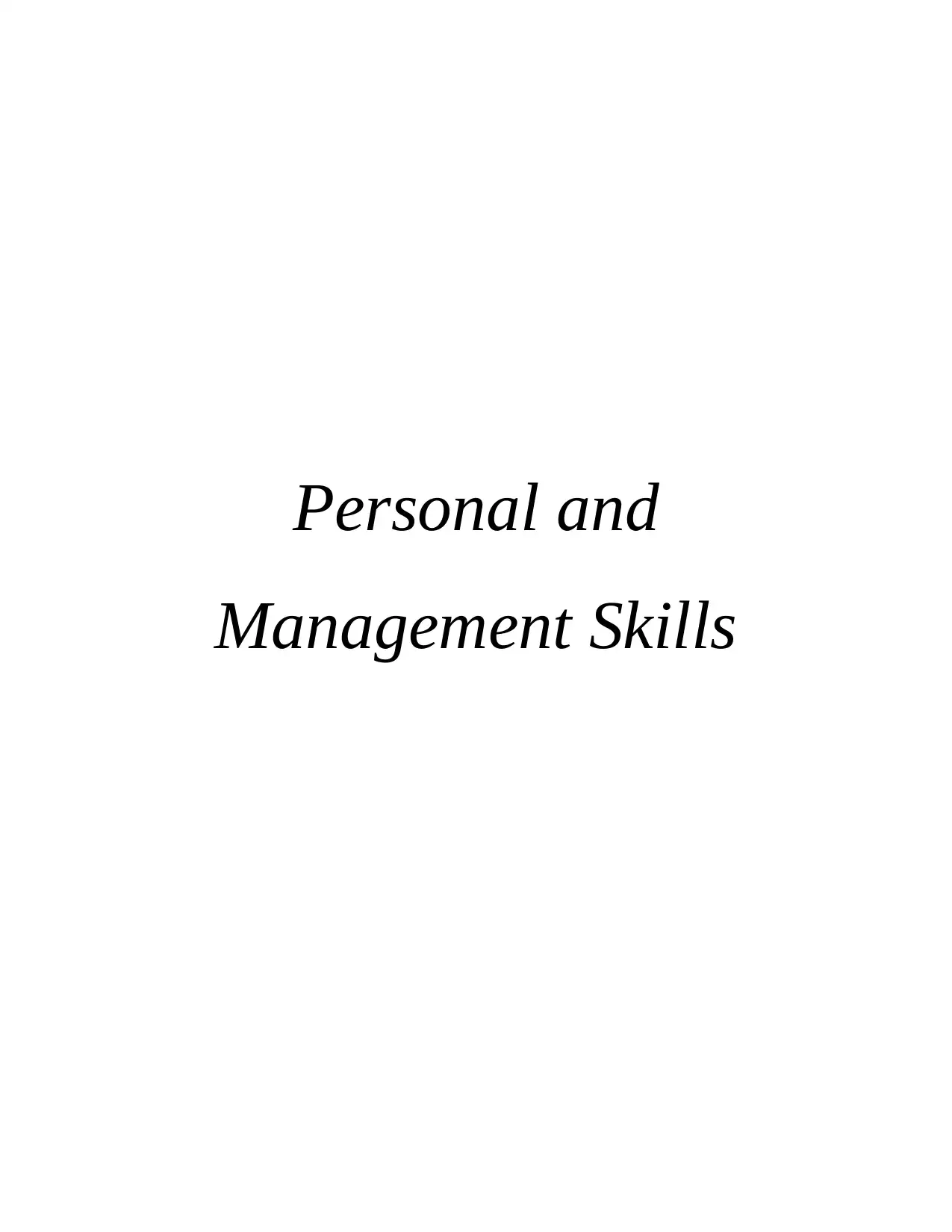
Personal and
Management Skills
Management Skills
Paraphrase This Document
Need a fresh take? Get an instant paraphrase of this document with our AI Paraphraser
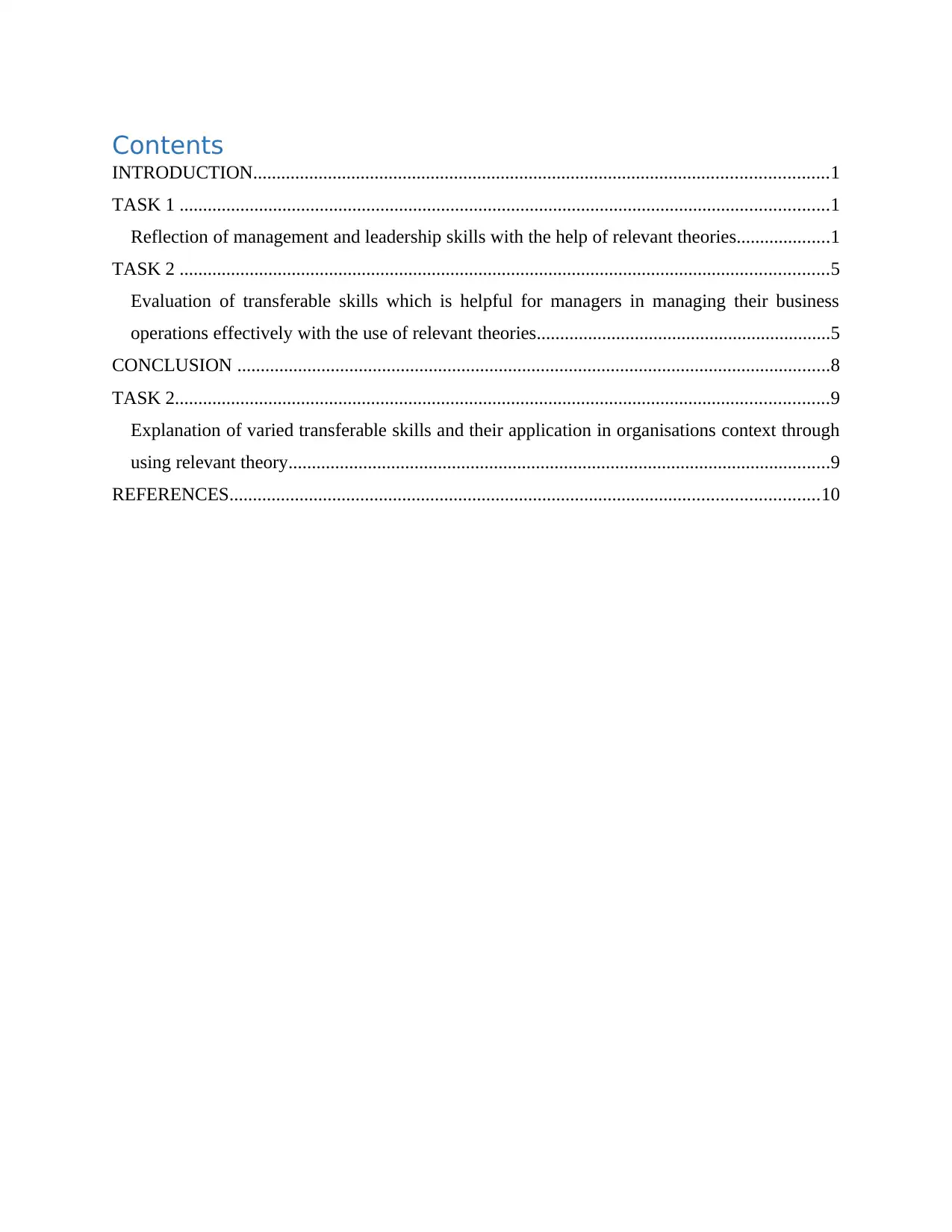
Contents
INTRODUCTION...........................................................................................................................1
TASK 1 ...........................................................................................................................................1
Reflection of management and leadership skills with the help of relevant theories....................1
TASK 2 ...........................................................................................................................................5
Evaluation of transferable skills which is helpful for managers in managing their business
operations effectively with the use of relevant theories...............................................................5
CONCLUSION ...............................................................................................................................8
TASK 2............................................................................................................................................9
Explanation of varied transferable skills and their application in organisations context through
using relevant theory....................................................................................................................9
REFERENCES..............................................................................................................................10
INTRODUCTION...........................................................................................................................1
TASK 1 ...........................................................................................................................................1
Reflection of management and leadership skills with the help of relevant theories....................1
TASK 2 ...........................................................................................................................................5
Evaluation of transferable skills which is helpful for managers in managing their business
operations effectively with the use of relevant theories...............................................................5
CONCLUSION ...............................................................................................................................8
TASK 2............................................................................................................................................9
Explanation of varied transferable skills and their application in organisations context through
using relevant theory....................................................................................................................9
REFERENCES..............................................................................................................................10

⊘ This is a preview!⊘
Do you want full access?
Subscribe today to unlock all pages.

Trusted by 1+ million students worldwide
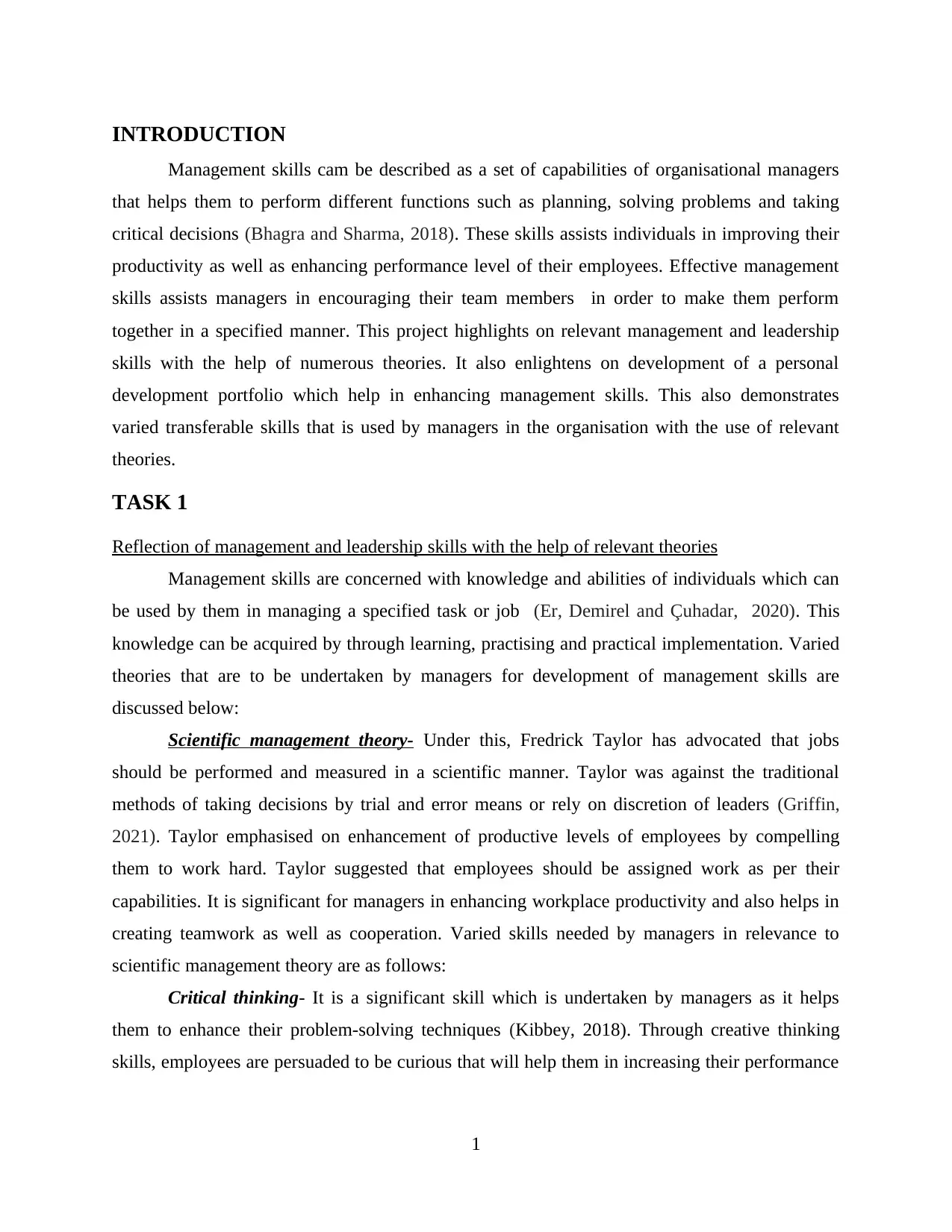
INTRODUCTION
Management skills cam be described as a set of capabilities of organisational managers
that helps them to perform different functions such as planning, solving problems and taking
critical decisions (Bhagra and Sharma, 2018). These skills assists individuals in improving their
productivity as well as enhancing performance level of their employees. Effective management
skills assists managers in encouraging their team members in order to make them perform
together in a specified manner. This project highlights on relevant management and leadership
skills with the help of numerous theories. It also enlightens on development of a personal
development portfolio which help in enhancing management skills. This also demonstrates
varied transferable skills that is used by managers in the organisation with the use of relevant
theories.
TASK 1
Reflection of management and leadership skills with the help of relevant theories
Management skills are concerned with knowledge and abilities of individuals which can
be used by them in managing a specified task or job (Er, Demirel and Çuhadar, 2020). This
knowledge can be acquired by through learning, practising and practical implementation. Varied
theories that are to be undertaken by managers for development of management skills are
discussed below:
Scientific management theory- Under this, Fredrick Taylor has advocated that jobs
should be performed and measured in a scientific manner. Taylor was against the traditional
methods of taking decisions by trial and error means or rely on discretion of leaders (Griffin,
2021). Taylor emphasised on enhancement of productive levels of employees by compelling
them to work hard. Taylor suggested that employees should be assigned work as per their
capabilities. It is significant for managers in enhancing workplace productivity and also helps in
creating teamwork as well as cooperation. Varied skills needed by managers in relevance to
scientific management theory are as follows:
Critical thinking- It is a significant skill which is undertaken by managers as it helps
them to enhance their problem-solving techniques (Kibbey, 2018). Through creative thinking
skills, employees are persuaded to be curious that will help them in increasing their performance
1
Management skills cam be described as a set of capabilities of organisational managers
that helps them to perform different functions such as planning, solving problems and taking
critical decisions (Bhagra and Sharma, 2018). These skills assists individuals in improving their
productivity as well as enhancing performance level of their employees. Effective management
skills assists managers in encouraging their team members in order to make them perform
together in a specified manner. This project highlights on relevant management and leadership
skills with the help of numerous theories. It also enlightens on development of a personal
development portfolio which help in enhancing management skills. This also demonstrates
varied transferable skills that is used by managers in the organisation with the use of relevant
theories.
TASK 1
Reflection of management and leadership skills with the help of relevant theories
Management skills are concerned with knowledge and abilities of individuals which can
be used by them in managing a specified task or job (Er, Demirel and Çuhadar, 2020). This
knowledge can be acquired by through learning, practising and practical implementation. Varied
theories that are to be undertaken by managers for development of management skills are
discussed below:
Scientific management theory- Under this, Fredrick Taylor has advocated that jobs
should be performed and measured in a scientific manner. Taylor was against the traditional
methods of taking decisions by trial and error means or rely on discretion of leaders (Griffin,
2021). Taylor emphasised on enhancement of productive levels of employees by compelling
them to work hard. Taylor suggested that employees should be assigned work as per their
capabilities. It is significant for managers in enhancing workplace productivity and also helps in
creating teamwork as well as cooperation. Varied skills needed by managers in relevance to
scientific management theory are as follows:
Critical thinking- It is a significant skill which is undertaken by managers as it helps
them to enhance their problem-solving techniques (Kibbey, 2018). Through creative thinking
skills, employees are persuaded to be curious that will help them in increasing their performance
1
Paraphrase This Document
Need a fresh take? Get an instant paraphrase of this document with our AI Paraphraser
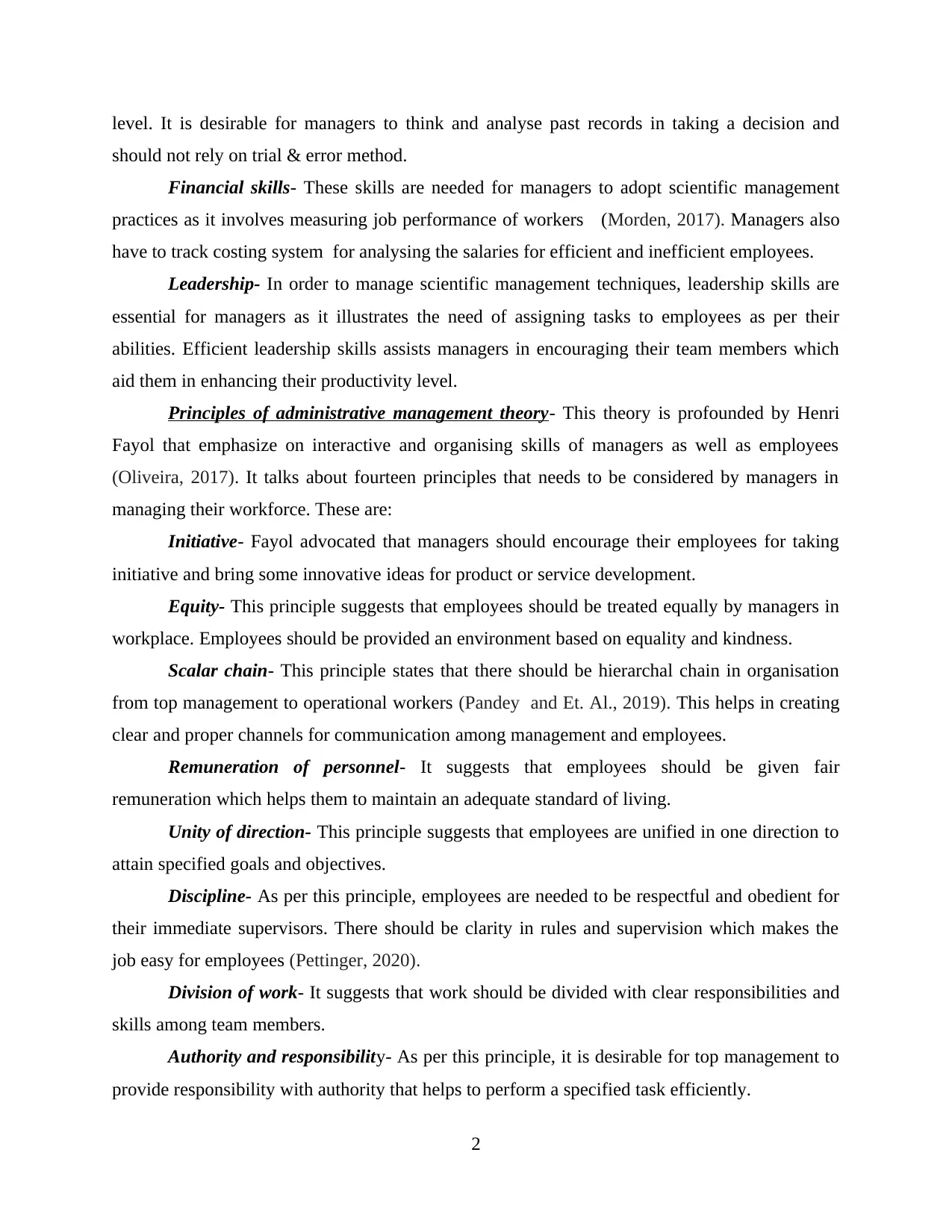
level. It is desirable for managers to think and analyse past records in taking a decision and
should not rely on trial & error method.
Financial skills- These skills are needed for managers to adopt scientific management
practices as it involves measuring job performance of workers (Morden, 2017). Managers also
have to track costing system for analysing the salaries for efficient and inefficient employees.
Leadership- In order to manage scientific management techniques, leadership skills are
essential for managers as it illustrates the need of assigning tasks to employees as per their
abilities. Efficient leadership skills assists managers in encouraging their team members which
aid them in enhancing their productivity level.
Principles of administrative management theory- This theory is profounded by Henri
Fayol that emphasize on interactive and organising skills of managers as well as employees
(Oliveira, 2017). It talks about fourteen principles that needs to be considered by managers in
managing their workforce. These are:
Initiative- Fayol advocated that managers should encourage their employees for taking
initiative and bring some innovative ideas for product or service development.
Equity- This principle suggests that employees should be treated equally by managers in
workplace. Employees should be provided an environment based on equality and kindness.
Scalar chain- This principle states that there should be hierarchal chain in organisation
from top management to operational workers (Pandey and Et. Al., 2019). This helps in creating
clear and proper channels for communication among management and employees.
Remuneration of personnel- It suggests that employees should be given fair
remuneration which helps them to maintain an adequate standard of living.
Unity of direction- This principle suggests that employees are unified in one direction to
attain specified goals and objectives.
Discipline- As per this principle, employees are needed to be respectful and obedient for
their immediate supervisors. There should be clarity in rules and supervision which makes the
job easy for employees (Pettinger, 2020).
Division of work- It suggests that work should be divided with clear responsibilities and
skills among team members.
Authority and responsibility- As per this principle, it is desirable for top management to
provide responsibility with authority that helps to perform a specified task efficiently.
2
should not rely on trial & error method.
Financial skills- These skills are needed for managers to adopt scientific management
practices as it involves measuring job performance of workers (Morden, 2017). Managers also
have to track costing system for analysing the salaries for efficient and inefficient employees.
Leadership- In order to manage scientific management techniques, leadership skills are
essential for managers as it illustrates the need of assigning tasks to employees as per their
abilities. Efficient leadership skills assists managers in encouraging their team members which
aid them in enhancing their productivity level.
Principles of administrative management theory- This theory is profounded by Henri
Fayol that emphasize on interactive and organising skills of managers as well as employees
(Oliveira, 2017). It talks about fourteen principles that needs to be considered by managers in
managing their workforce. These are:
Initiative- Fayol advocated that managers should encourage their employees for taking
initiative and bring some innovative ideas for product or service development.
Equity- This principle suggests that employees should be treated equally by managers in
workplace. Employees should be provided an environment based on equality and kindness.
Scalar chain- This principle states that there should be hierarchal chain in organisation
from top management to operational workers (Pandey and Et. Al., 2019). This helps in creating
clear and proper channels for communication among management and employees.
Remuneration of personnel- It suggests that employees should be given fair
remuneration which helps them to maintain an adequate standard of living.
Unity of direction- This principle suggests that employees are unified in one direction to
attain specified goals and objectives.
Discipline- As per this principle, employees are needed to be respectful and obedient for
their immediate supervisors. There should be clarity in rules and supervision which makes the
job easy for employees (Pettinger, 2020).
Division of work- It suggests that work should be divided with clear responsibilities and
skills among team members.
Authority and responsibility- As per this principle, it is desirable for top management to
provide responsibility with authority that helps to perform a specified task efficiently.
2
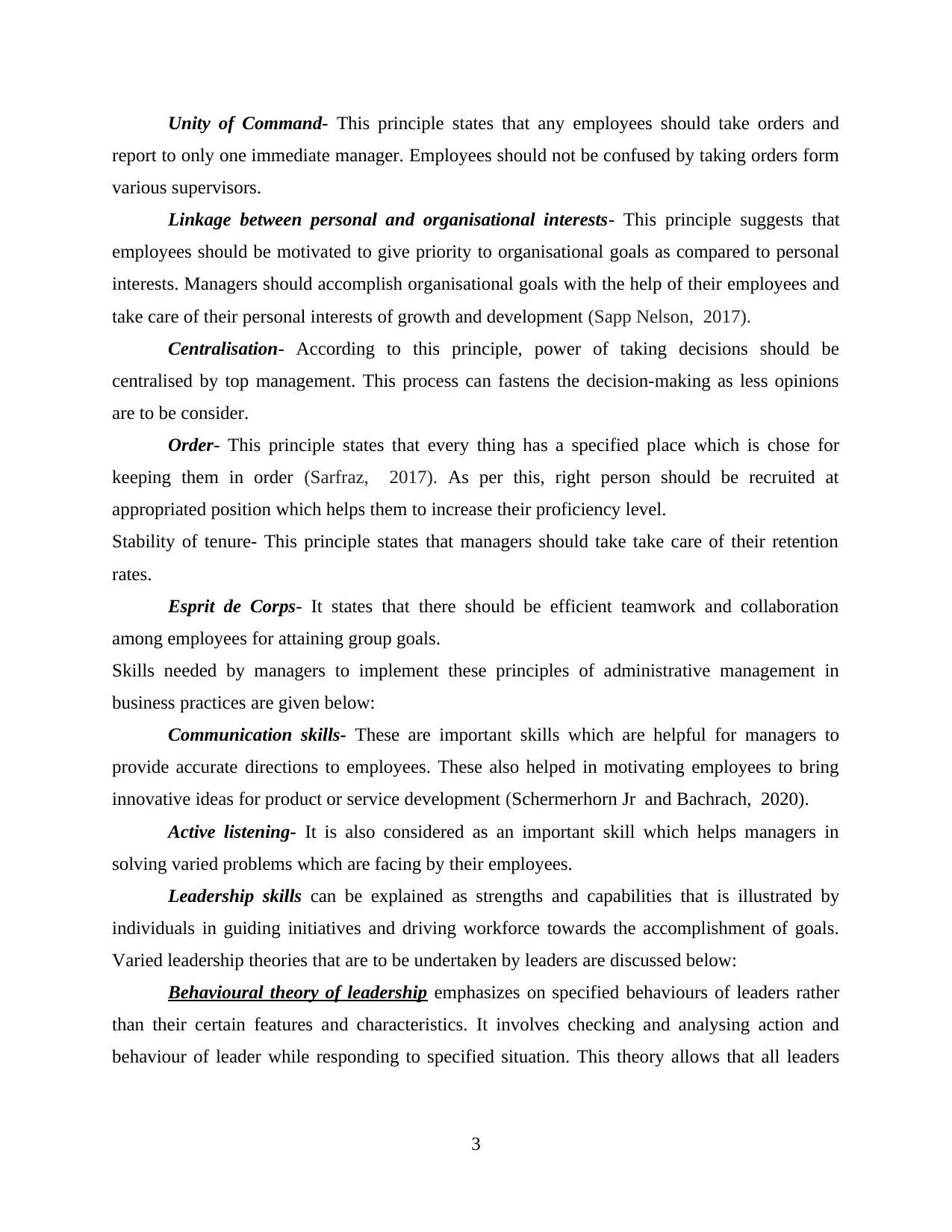
Unity of Command- This principle states that any employees should take orders and
report to only one immediate manager. Employees should not be confused by taking orders form
various supervisors.
Linkage between personal and organisational interests- This principle suggests that
employees should be motivated to give priority to organisational goals as compared to personal
interests. Managers should accomplish organisational goals with the help of their employees and
take care of their personal interests of growth and development (Sapp Nelson, 2017).
Centralisation- According to this principle, power of taking decisions should be
centralised by top management. This process can fastens the decision-making as less opinions
are to be consider.
Order- This principle states that every thing has a specified place which is chose for
keeping them in order (Sarfraz, 2017). As per this, right person should be recruited at
appropriated position which helps them to increase their proficiency level.
Stability of tenure- This principle states that managers should take take care of their retention
rates.
Esprit de Corps- It states that there should be efficient teamwork and collaboration
among employees for attaining group goals.
Skills needed by managers to implement these principles of administrative management in
business practices are given below:
Communication skills- These are important skills which are helpful for managers to
provide accurate directions to employees. These also helped in motivating employees to bring
innovative ideas for product or service development (Schermerhorn Jr and Bachrach, 2020).
Active listening- It is also considered as an important skill which helps managers in
solving varied problems which are facing by their employees.
Leadership skills can be explained as strengths and capabilities that is illustrated by
individuals in guiding initiatives and driving workforce towards the accomplishment of goals.
Varied leadership theories that are to be undertaken by leaders are discussed below:
Behavioural theory of leadership emphasizes on specified behaviours of leaders rather
than their certain features and characteristics. It involves checking and analysing action and
behaviour of leader while responding to specified situation. This theory allows that all leaders
3
report to only one immediate manager. Employees should not be confused by taking orders form
various supervisors.
Linkage between personal and organisational interests- This principle suggests that
employees should be motivated to give priority to organisational goals as compared to personal
interests. Managers should accomplish organisational goals with the help of their employees and
take care of their personal interests of growth and development (Sapp Nelson, 2017).
Centralisation- According to this principle, power of taking decisions should be
centralised by top management. This process can fastens the decision-making as less opinions
are to be consider.
Order- This principle states that every thing has a specified place which is chose for
keeping them in order (Sarfraz, 2017). As per this, right person should be recruited at
appropriated position which helps them to increase their proficiency level.
Stability of tenure- This principle states that managers should take take care of their retention
rates.
Esprit de Corps- It states that there should be efficient teamwork and collaboration
among employees for attaining group goals.
Skills needed by managers to implement these principles of administrative management in
business practices are given below:
Communication skills- These are important skills which are helpful for managers to
provide accurate directions to employees. These also helped in motivating employees to bring
innovative ideas for product or service development (Schermerhorn Jr and Bachrach, 2020).
Active listening- It is also considered as an important skill which helps managers in
solving varied problems which are facing by their employees.
Leadership skills can be explained as strengths and capabilities that is illustrated by
individuals in guiding initiatives and driving workforce towards the accomplishment of goals.
Varied leadership theories that are to be undertaken by leaders are discussed below:
Behavioural theory of leadership emphasizes on specified behaviours of leaders rather
than their certain features and characteristics. It involves checking and analysing action and
behaviour of leader while responding to specified situation. This theory allows that all leaders
3
⊘ This is a preview!⊘
Do you want full access?
Subscribe today to unlock all pages.

Trusted by 1+ million students worldwide
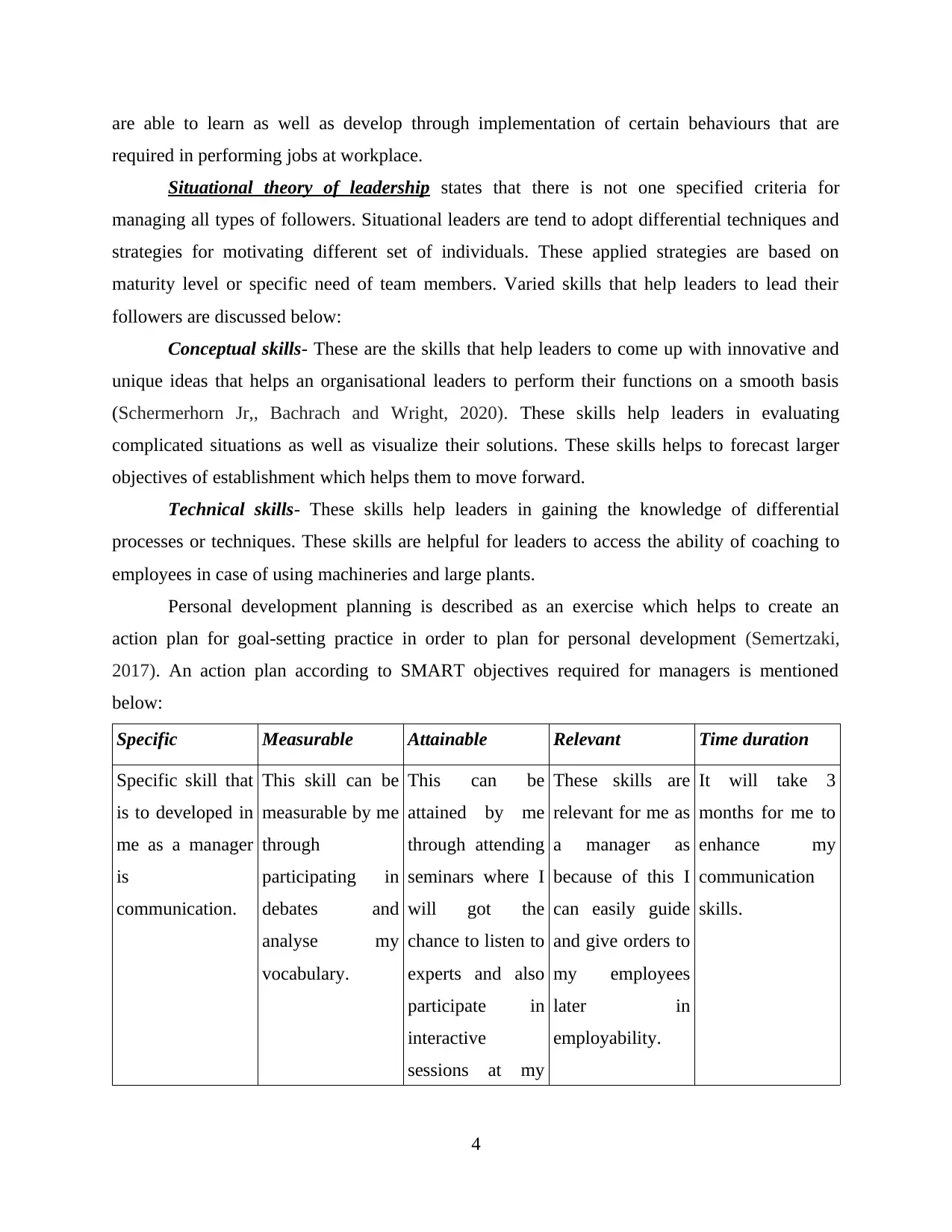
are able to learn as well as develop through implementation of certain behaviours that are
required in performing jobs at workplace.
Situational theory of leadership states that there is not one specified criteria for
managing all types of followers. Situational leaders are tend to adopt differential techniques and
strategies for motivating different set of individuals. These applied strategies are based on
maturity level or specific need of team members. Varied skills that help leaders to lead their
followers are discussed below:
Conceptual skills- These are the skills that help leaders to come up with innovative and
unique ideas that helps an organisational leaders to perform their functions on a smooth basis
(Schermerhorn Jr,, Bachrach and Wright, 2020). These skills help leaders in evaluating
complicated situations as well as visualize their solutions. These skills helps to forecast larger
objectives of establishment which helps them to move forward.
Technical skills- These skills help leaders in gaining the knowledge of differential
processes or techniques. These skills are helpful for leaders to access the ability of coaching to
employees in case of using machineries and large plants.
Personal development planning is described as an exercise which helps to create an
action plan for goal-setting practice in order to plan for personal development (Semertzaki,
2017). An action plan according to SMART objectives required for managers is mentioned
below:
Specific Measurable Attainable Relevant Time duration
Specific skill that
is to developed in
me as a manager
is
communication.
This skill can be
measurable by me
through
participating in
debates and
analyse my
vocabulary.
This can be
attained by me
through attending
seminars where I
will got the
chance to listen to
experts and also
participate in
interactive
sessions at my
These skills are
relevant for me as
a manager as
because of this I
can easily guide
and give orders to
my employees
later in
employability.
It will take 3
months for me to
enhance my
communication
skills.
4
required in performing jobs at workplace.
Situational theory of leadership states that there is not one specified criteria for
managing all types of followers. Situational leaders are tend to adopt differential techniques and
strategies for motivating different set of individuals. These applied strategies are based on
maturity level or specific need of team members. Varied skills that help leaders to lead their
followers are discussed below:
Conceptual skills- These are the skills that help leaders to come up with innovative and
unique ideas that helps an organisational leaders to perform their functions on a smooth basis
(Schermerhorn Jr,, Bachrach and Wright, 2020). These skills help leaders in evaluating
complicated situations as well as visualize their solutions. These skills helps to forecast larger
objectives of establishment which helps them to move forward.
Technical skills- These skills help leaders in gaining the knowledge of differential
processes or techniques. These skills are helpful for leaders to access the ability of coaching to
employees in case of using machineries and large plants.
Personal development planning is described as an exercise which helps to create an
action plan for goal-setting practice in order to plan for personal development (Semertzaki,
2017). An action plan according to SMART objectives required for managers is mentioned
below:
Specific Measurable Attainable Relevant Time duration
Specific skill that
is to developed in
me as a manager
is
communication.
This skill can be
measurable by me
through
participating in
debates and
analyse my
vocabulary.
This can be
attained by me
through attending
seminars where I
will got the
chance to listen to
experts and also
participate in
interactive
sessions at my
These skills are
relevant for me as
a manager as
because of this I
can easily guide
and give orders to
my employees
later in
employability.
It will take 3
months for me to
enhance my
communication
skills.
4
Paraphrase This Document
Need a fresh take? Get an instant paraphrase of this document with our AI Paraphraser
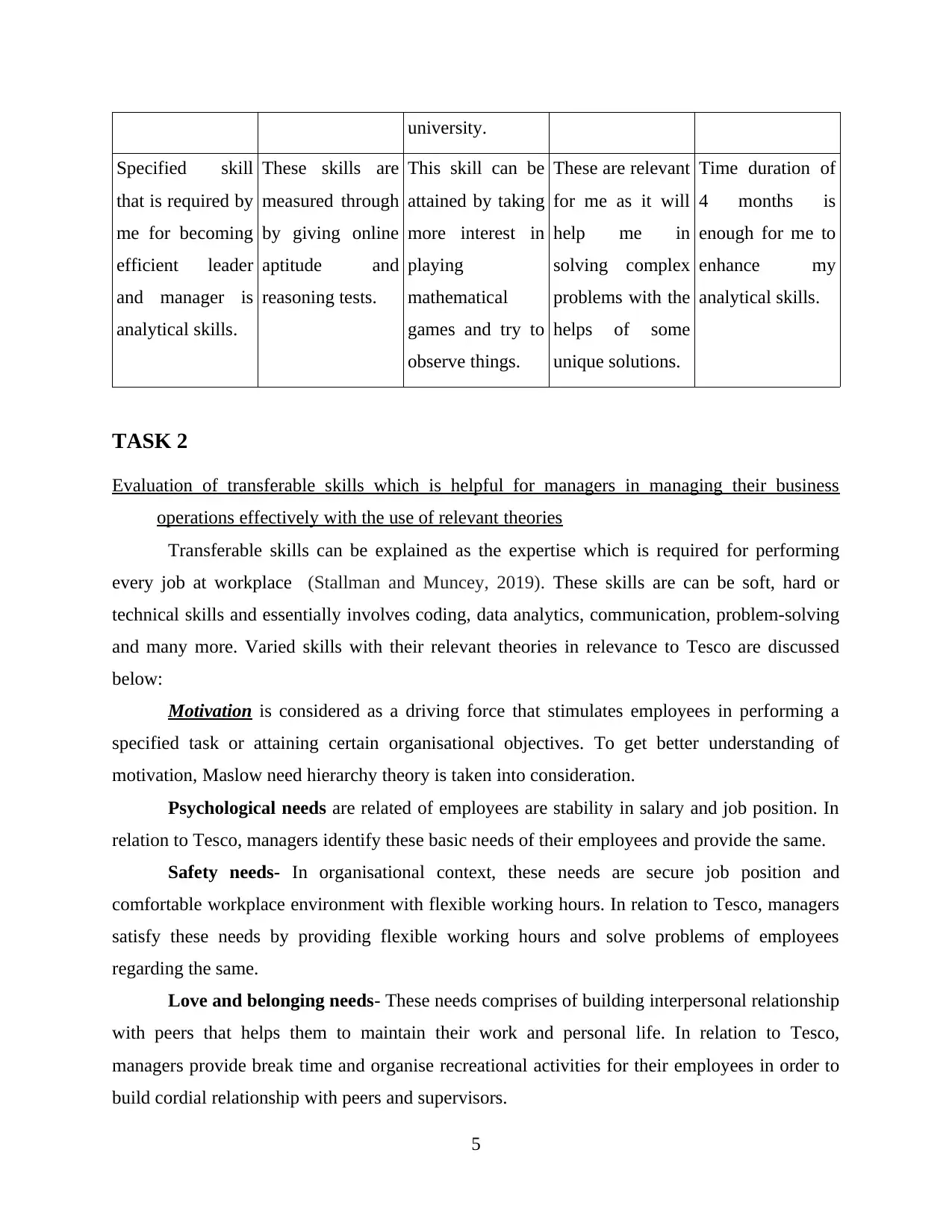
university.
Specified skill
that is required by
me for becoming
efficient leader
and manager is
analytical skills.
These skills are
measured through
by giving online
aptitude and
reasoning tests.
This skill can be
attained by taking
more interest in
playing
mathematical
games and try to
observe things.
These are relevant
for me as it will
help me in
solving complex
problems with the
helps of some
unique solutions.
Time duration of
4 months is
enough for me to
enhance my
analytical skills.
TASK 2
Evaluation of transferable skills which is helpful for managers in managing their business
operations effectively with the use of relevant theories
Transferable skills can be explained as the expertise which is required for performing
every job at workplace (Stallman and Muncey, 2019). These skills are can be soft, hard or
technical skills and essentially involves coding, data analytics, communication, problem-solving
and many more. Varied skills with their relevant theories in relevance to Tesco are discussed
below:
Motivation is considered as a driving force that stimulates employees in performing a
specified task or attaining certain organisational objectives. To get better understanding of
motivation, Maslow need hierarchy theory is taken into consideration.
Psychological needs are related of employees are stability in salary and job position. In
relation to Tesco, managers identify these basic needs of their employees and provide the same.
Safety needs- In organisational context, these needs are secure job position and
comfortable workplace environment with flexible working hours. In relation to Tesco, managers
satisfy these needs by providing flexible working hours and solve problems of employees
regarding the same.
Love and belonging needs- These needs comprises of building interpersonal relationship
with peers that helps them to maintain their work and personal life. In relation to Tesco,
managers provide break time and organise recreational activities for their employees in order to
build cordial relationship with peers and supervisors.
5
Specified skill
that is required by
me for becoming
efficient leader
and manager is
analytical skills.
These skills are
measured through
by giving online
aptitude and
reasoning tests.
This skill can be
attained by taking
more interest in
playing
mathematical
games and try to
observe things.
These are relevant
for me as it will
help me in
solving complex
problems with the
helps of some
unique solutions.
Time duration of
4 months is
enough for me to
enhance my
analytical skills.
TASK 2
Evaluation of transferable skills which is helpful for managers in managing their business
operations effectively with the use of relevant theories
Transferable skills can be explained as the expertise which is required for performing
every job at workplace (Stallman and Muncey, 2019). These skills are can be soft, hard or
technical skills and essentially involves coding, data analytics, communication, problem-solving
and many more. Varied skills with their relevant theories in relevance to Tesco are discussed
below:
Motivation is considered as a driving force that stimulates employees in performing a
specified task or attaining certain organisational objectives. To get better understanding of
motivation, Maslow need hierarchy theory is taken into consideration.
Psychological needs are related of employees are stability in salary and job position. In
relation to Tesco, managers identify these basic needs of their employees and provide the same.
Safety needs- In organisational context, these needs are secure job position and
comfortable workplace environment with flexible working hours. In relation to Tesco, managers
satisfy these needs by providing flexible working hours and solve problems of employees
regarding the same.
Love and belonging needs- These needs comprises of building interpersonal relationship
with peers that helps them to maintain their work and personal life. In relation to Tesco,
managers provide break time and organise recreational activities for their employees in order to
build cordial relationship with peers and supervisors.
5
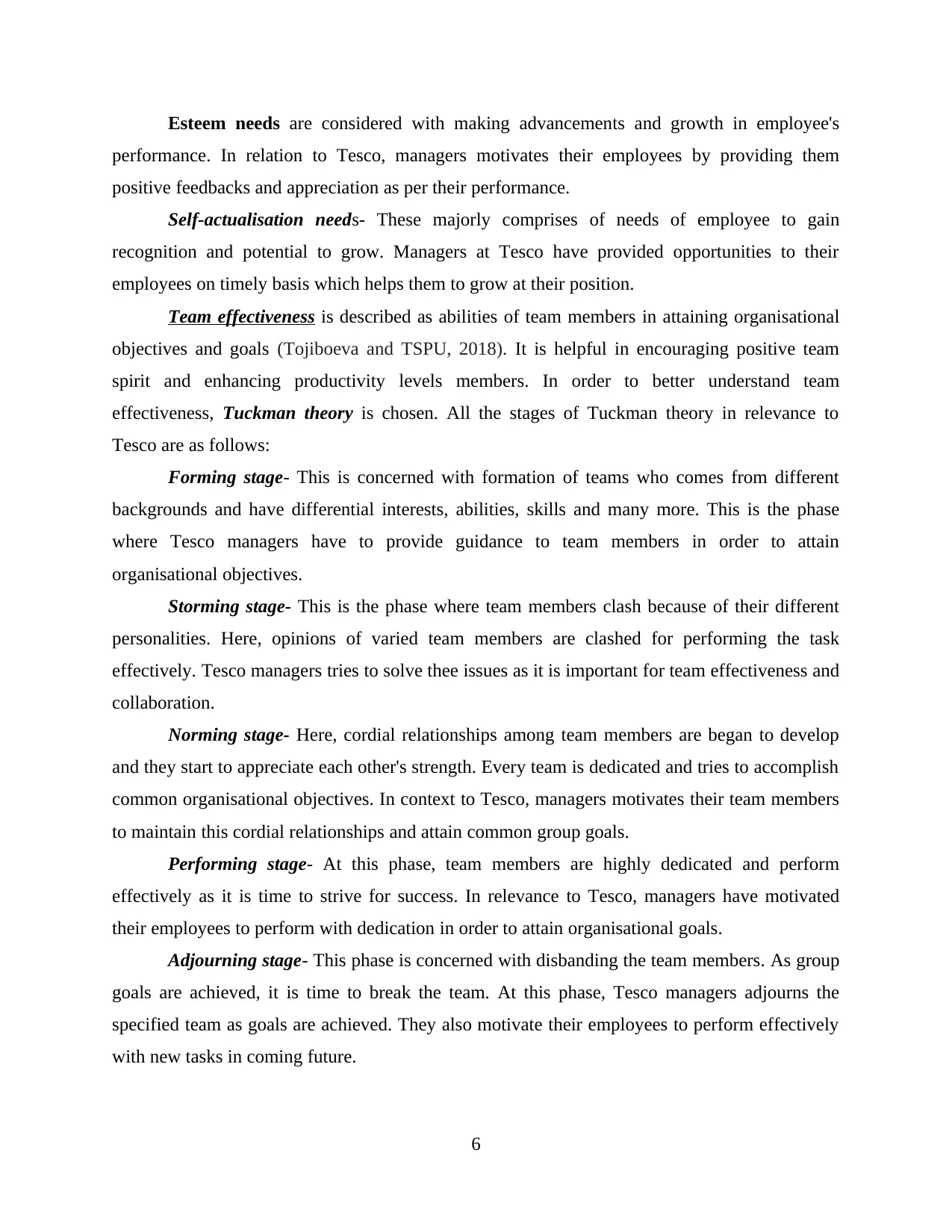
Esteem needs are considered with making advancements and growth in employee's
performance. In relation to Tesco, managers motivates their employees by providing them
positive feedbacks and appreciation as per their performance.
Self-actualisation needs- These majorly comprises of needs of employee to gain
recognition and potential to grow. Managers at Tesco have provided opportunities to their
employees on timely basis which helps them to grow at their position.
Team effectiveness is described as abilities of team members in attaining organisational
objectives and goals (Tojiboeva and TSPU, 2018). It is helpful in encouraging positive team
spirit and enhancing productivity levels members. In order to better understand team
effectiveness, Tuckman theory is chosen. All the stages of Tuckman theory in relevance to
Tesco are as follows:
Forming stage- This is concerned with formation of teams who comes from different
backgrounds and have differential interests, abilities, skills and many more. This is the phase
where Tesco managers have to provide guidance to team members in order to attain
organisational objectives.
Storming stage- This is the phase where team members clash because of their different
personalities. Here, opinions of varied team members are clashed for performing the task
effectively. Tesco managers tries to solve thee issues as it is important for team effectiveness and
collaboration.
Norming stage- Here, cordial relationships among team members are began to develop
and they start to appreciate each other's strength. Every team is dedicated and tries to accomplish
common organisational objectives. In context to Tesco, managers motivates their team members
to maintain this cordial relationships and attain common group goals.
Performing stage- At this phase, team members are highly dedicated and perform
effectively as it is time to strive for success. In relevance to Tesco, managers have motivated
their employees to perform with dedication in order to attain organisational goals.
Adjourning stage- This phase is concerned with disbanding the team members. As group
goals are achieved, it is time to break the team. At this phase, Tesco managers adjourns the
specified team as goals are achieved. They also motivate their employees to perform effectively
with new tasks in coming future.
6
performance. In relation to Tesco, managers motivates their employees by providing them
positive feedbacks and appreciation as per their performance.
Self-actualisation needs- These majorly comprises of needs of employee to gain
recognition and potential to grow. Managers at Tesco have provided opportunities to their
employees on timely basis which helps them to grow at their position.
Team effectiveness is described as abilities of team members in attaining organisational
objectives and goals (Tojiboeva and TSPU, 2018). It is helpful in encouraging positive team
spirit and enhancing productivity levels members. In order to better understand team
effectiveness, Tuckman theory is chosen. All the stages of Tuckman theory in relevance to
Tesco are as follows:
Forming stage- This is concerned with formation of teams who comes from different
backgrounds and have differential interests, abilities, skills and many more. This is the phase
where Tesco managers have to provide guidance to team members in order to attain
organisational objectives.
Storming stage- This is the phase where team members clash because of their different
personalities. Here, opinions of varied team members are clashed for performing the task
effectively. Tesco managers tries to solve thee issues as it is important for team effectiveness and
collaboration.
Norming stage- Here, cordial relationships among team members are began to develop
and they start to appreciate each other's strength. Every team is dedicated and tries to accomplish
common organisational objectives. In context to Tesco, managers motivates their team members
to maintain this cordial relationships and attain common group goals.
Performing stage- At this phase, team members are highly dedicated and perform
effectively as it is time to strive for success. In relevance to Tesco, managers have motivated
their employees to perform with dedication in order to attain organisational goals.
Adjourning stage- This phase is concerned with disbanding the team members. As group
goals are achieved, it is time to break the team. At this phase, Tesco managers adjourns the
specified team as goals are achieved. They also motivate their employees to perform effectively
with new tasks in coming future.
6
⊘ This is a preview!⊘
Do you want full access?
Subscribe today to unlock all pages.

Trusted by 1+ million students worldwide
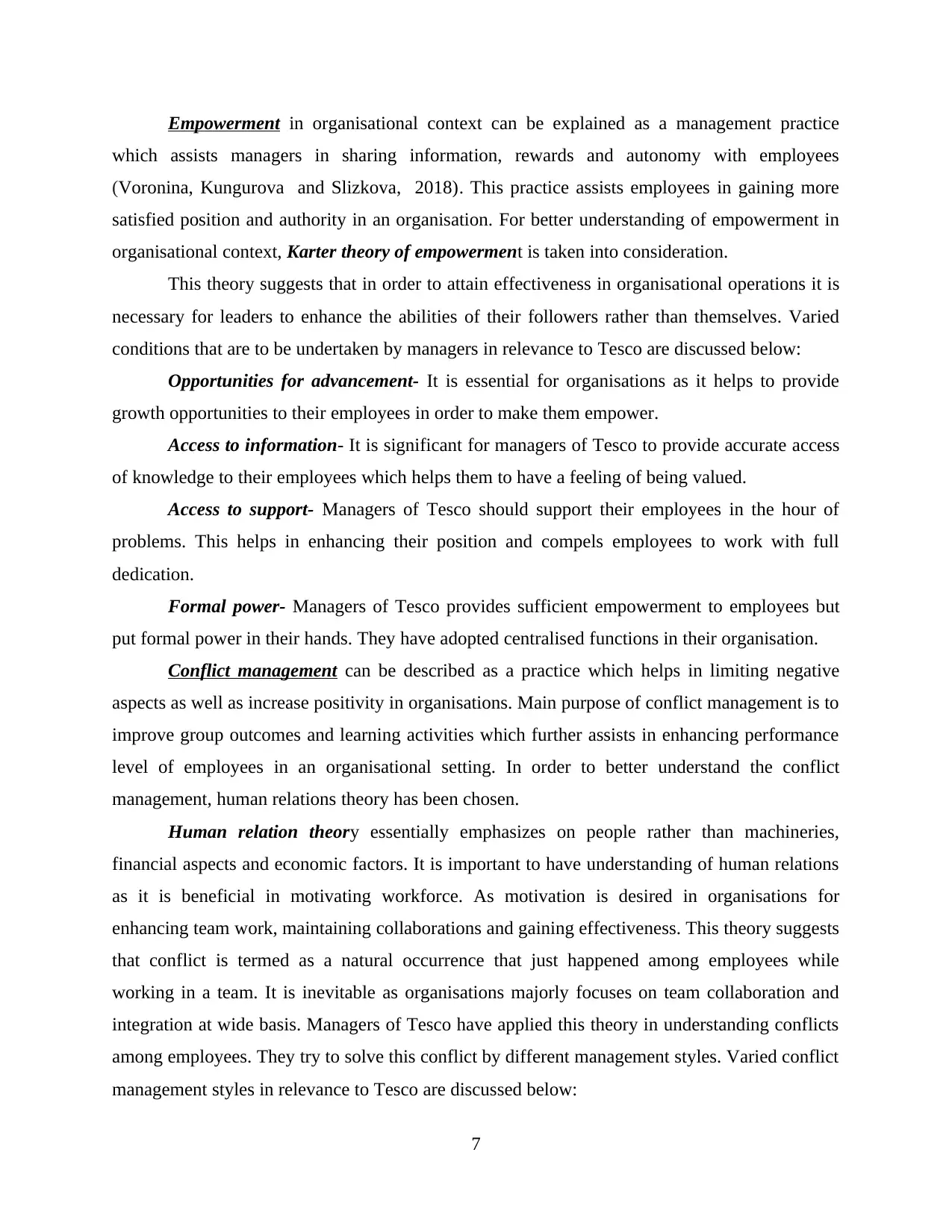
Empowerment in organisational context can be explained as a management practice
which assists managers in sharing information, rewards and autonomy with employees
(Voronina, Kungurova and Slizkova, 2018). This practice assists employees in gaining more
satisfied position and authority in an organisation. For better understanding of empowerment in
organisational context, Karter theory of empowerment is taken into consideration.
This theory suggests that in order to attain effectiveness in organisational operations it is
necessary for leaders to enhance the abilities of their followers rather than themselves. Varied
conditions that are to be undertaken by managers in relevance to Tesco are discussed below:
Opportunities for advancement- It is essential for organisations as it helps to provide
growth opportunities to their employees in order to make them empower.
Access to information- It is significant for managers of Tesco to provide accurate access
of knowledge to their employees which helps them to have a feeling of being valued.
Access to support- Managers of Tesco should support their employees in the hour of
problems. This helps in enhancing their position and compels employees to work with full
dedication.
Formal power- Managers of Tesco provides sufficient empowerment to employees but
put formal power in their hands. They have adopted centralised functions in their organisation.
Conflict management can be described as a practice which helps in limiting negative
aspects as well as increase positivity in organisations. Main purpose of conflict management is to
improve group outcomes and learning activities which further assists in enhancing performance
level of employees in an organisational setting. In order to better understand the conflict
management, human relations theory has been chosen.
Human relation theory essentially emphasizes on people rather than machineries,
financial aspects and economic factors. It is important to have understanding of human relations
as it is beneficial in motivating workforce. As motivation is desired in organisations for
enhancing team work, maintaining collaborations and gaining effectiveness. This theory suggests
that conflict is termed as a natural occurrence that just happened among employees while
working in a team. It is inevitable as organisations majorly focuses on team collaboration and
integration at wide basis. Managers of Tesco have applied this theory in understanding conflicts
among employees. They try to solve this conflict by different management styles. Varied conflict
management styles in relevance to Tesco are discussed below:
7
which assists managers in sharing information, rewards and autonomy with employees
(Voronina, Kungurova and Slizkova, 2018). This practice assists employees in gaining more
satisfied position and authority in an organisation. For better understanding of empowerment in
organisational context, Karter theory of empowerment is taken into consideration.
This theory suggests that in order to attain effectiveness in organisational operations it is
necessary for leaders to enhance the abilities of their followers rather than themselves. Varied
conditions that are to be undertaken by managers in relevance to Tesco are discussed below:
Opportunities for advancement- It is essential for organisations as it helps to provide
growth opportunities to their employees in order to make them empower.
Access to information- It is significant for managers of Tesco to provide accurate access
of knowledge to their employees which helps them to have a feeling of being valued.
Access to support- Managers of Tesco should support their employees in the hour of
problems. This helps in enhancing their position and compels employees to work with full
dedication.
Formal power- Managers of Tesco provides sufficient empowerment to employees but
put formal power in their hands. They have adopted centralised functions in their organisation.
Conflict management can be described as a practice which helps in limiting negative
aspects as well as increase positivity in organisations. Main purpose of conflict management is to
improve group outcomes and learning activities which further assists in enhancing performance
level of employees in an organisational setting. In order to better understand the conflict
management, human relations theory has been chosen.
Human relation theory essentially emphasizes on people rather than machineries,
financial aspects and economic factors. It is important to have understanding of human relations
as it is beneficial in motivating workforce. As motivation is desired in organisations for
enhancing team work, maintaining collaborations and gaining effectiveness. This theory suggests
that conflict is termed as a natural occurrence that just happened among employees while
working in a team. It is inevitable as organisations majorly focuses on team collaboration and
integration at wide basis. Managers of Tesco have applied this theory in understanding conflicts
among employees. They try to solve this conflict by different management styles. Varied conflict
management styles in relevance to Tesco are discussed below:
7
Paraphrase This Document
Need a fresh take? Get an instant paraphrase of this document with our AI Paraphraser
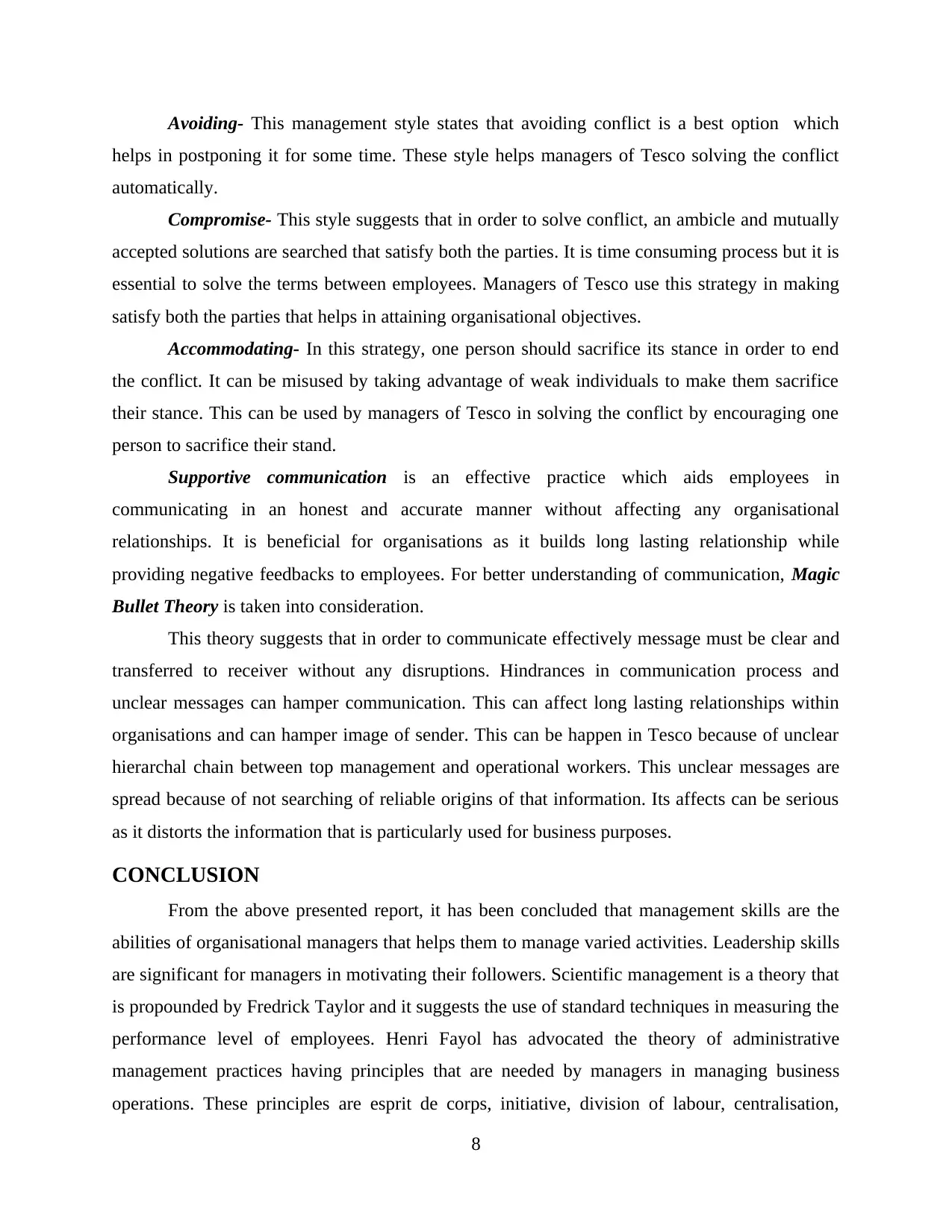
Avoiding- This management style states that avoiding conflict is a best option which
helps in postponing it for some time. These style helps managers of Tesco solving the conflict
automatically.
Compromise- This style suggests that in order to solve conflict, an ambicle and mutually
accepted solutions are searched that satisfy both the parties. It is time consuming process but it is
essential to solve the terms between employees. Managers of Tesco use this strategy in making
satisfy both the parties that helps in attaining organisational objectives.
Accommodating- In this strategy, one person should sacrifice its stance in order to end
the conflict. It can be misused by taking advantage of weak individuals to make them sacrifice
their stance. This can be used by managers of Tesco in solving the conflict by encouraging one
person to sacrifice their stand.
Supportive communication is an effective practice which aids employees in
communicating in an honest and accurate manner without affecting any organisational
relationships. It is beneficial for organisations as it builds long lasting relationship while
providing negative feedbacks to employees. For better understanding of communication, Magic
Bullet Theory is taken into consideration.
This theory suggests that in order to communicate effectively message must be clear and
transferred to receiver without any disruptions. Hindrances in communication process and
unclear messages can hamper communication. This can affect long lasting relationships within
organisations and can hamper image of sender. This can be happen in Tesco because of unclear
hierarchal chain between top management and operational workers. This unclear messages are
spread because of not searching of reliable origins of that information. Its affects can be serious
as it distorts the information that is particularly used for business purposes.
CONCLUSION
From the above presented report, it has been concluded that management skills are the
abilities of organisational managers that helps them to manage varied activities. Leadership skills
are significant for managers in motivating their followers. Scientific management is a theory that
is propounded by Fredrick Taylor and it suggests the use of standard techniques in measuring the
performance level of employees. Henri Fayol has advocated the theory of administrative
management practices having principles that are needed by managers in managing business
operations. These principles are esprit de corps, initiative, division of labour, centralisation,
8
helps in postponing it for some time. These style helps managers of Tesco solving the conflict
automatically.
Compromise- This style suggests that in order to solve conflict, an ambicle and mutually
accepted solutions are searched that satisfy both the parties. It is time consuming process but it is
essential to solve the terms between employees. Managers of Tesco use this strategy in making
satisfy both the parties that helps in attaining organisational objectives.
Accommodating- In this strategy, one person should sacrifice its stance in order to end
the conflict. It can be misused by taking advantage of weak individuals to make them sacrifice
their stance. This can be used by managers of Tesco in solving the conflict by encouraging one
person to sacrifice their stand.
Supportive communication is an effective practice which aids employees in
communicating in an honest and accurate manner without affecting any organisational
relationships. It is beneficial for organisations as it builds long lasting relationship while
providing negative feedbacks to employees. For better understanding of communication, Magic
Bullet Theory is taken into consideration.
This theory suggests that in order to communicate effectively message must be clear and
transferred to receiver without any disruptions. Hindrances in communication process and
unclear messages can hamper communication. This can affect long lasting relationships within
organisations and can hamper image of sender. This can be happen in Tesco because of unclear
hierarchal chain between top management and operational workers. This unclear messages are
spread because of not searching of reliable origins of that information. Its affects can be serious
as it distorts the information that is particularly used for business purposes.
CONCLUSION
From the above presented report, it has been concluded that management skills are the
abilities of organisational managers that helps them to manage varied activities. Leadership skills
are significant for managers in motivating their followers. Scientific management is a theory that
is propounded by Fredrick Taylor and it suggests the use of standard techniques in measuring the
performance level of employees. Henri Fayol has advocated the theory of administrative
management practices having principles that are needed by managers in managing business
operations. These principles are esprit de corps, initiative, division of labour, centralisation,
8

order, remuneration and many more. Behavioural theory is considered as analysing of specified
behaviours and traits that govern them. Varied skills are needed by managers in managing and
leading varied activities of organisation such as communication, analytical, technical,
conceptualising and many more.
9
behaviours and traits that govern them. Varied skills are needed by managers in managing and
leading varied activities of organisation such as communication, analytical, technical,
conceptualising and many more.
9
⊘ This is a preview!⊘
Do you want full access?
Subscribe today to unlock all pages.

Trusted by 1+ million students worldwide
1 out of 13
Related Documents
Your All-in-One AI-Powered Toolkit for Academic Success.
+13062052269
info@desklib.com
Available 24*7 on WhatsApp / Email
![[object Object]](/_next/static/media/star-bottom.7253800d.svg)
Unlock your academic potential
Copyright © 2020–2026 A2Z Services. All Rights Reserved. Developed and managed by ZUCOL.





